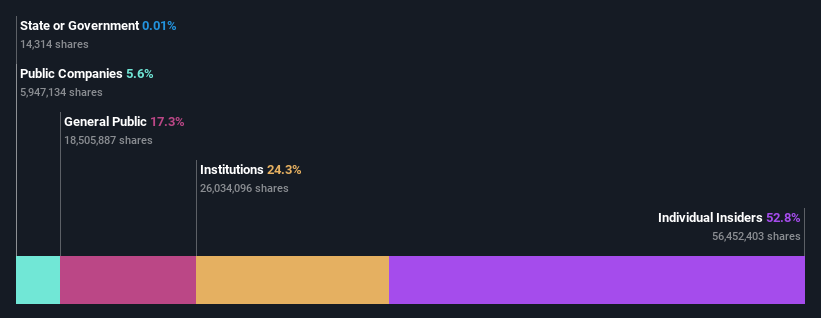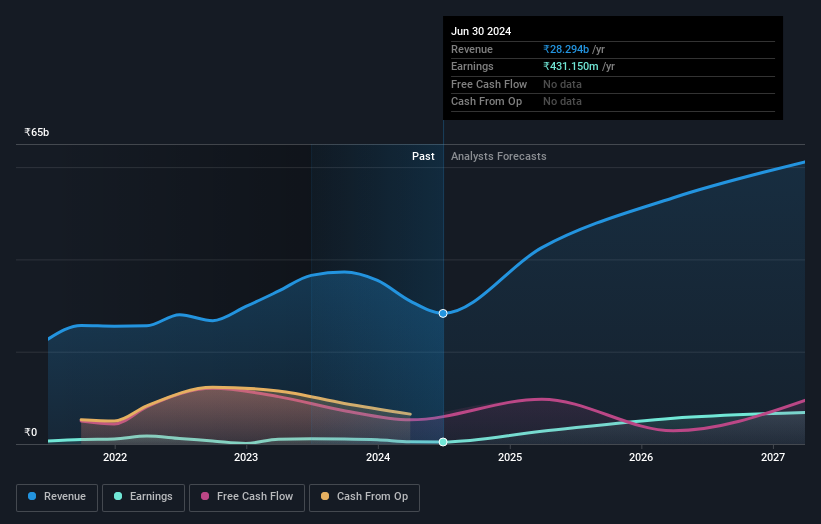- India
- /
- Real Estate
- /
- NSEI:SOBHAPP
The recent pullback must have dismayed Sobha Limited (NSE:SOBHAPP) insiders who own 53% of the company
Key Insights
- Sobha's significant insider ownership suggests inherent interests in company's expansion
- The top 3 shareholders own 55% of the company
- 24% of Sobha is held by Institutions
A look at the shareholders of Sobha Limited (NSE:SOBHAPP) can tell us which group is most powerful. And the group that holds the biggest piece of the pie are individual insiders with 53% ownership. In other words, the group stands to gain the most (or lose the most) from their investment into the company.
As market cap fell to ₹178b last week, insiders would have faced the highest losses than any other shareholder groups of the company.
Let's delve deeper into each type of owner of Sobha, beginning with the chart below.
View our latest analysis for Sobha

What Does The Institutional Ownership Tell Us About Sobha?
Institutions typically measure themselves against a benchmark when reporting to their own investors, so they often become more enthusiastic about a stock once it's included in a major index. We would expect most companies to have some institutions on the register, especially if they are growing.
We can see that Sobha does have institutional investors; and they hold a good portion of the company's stock. This suggests some credibility amongst professional investors. But we can't rely on that fact alone since institutions make bad investments sometimes, just like everyone does. If multiple institutions change their view on a stock at the same time, you could see the share price drop fast. It's therefore worth looking at Sobha's earnings history below. Of course, the future is what really matters.

Sobha is not owned by hedge funds. Sobha Menon is currently the largest shareholder, with 31% of shares outstanding. P. N. Menon is the second largest shareholder owning 19% of common stock, and Godrej Industries Limited holds about 5.6% of the company stock. P. N. Menon, who is the second-largest shareholder, also happens to hold the title of Top Key Executive.
After doing some more digging, we found that the top 3 shareholders collectively control more than half of the company's shares, implying that they have considerable power to influence the company's decisions.
Researching institutional ownership is a good way to gauge and filter a stock's expected performance. The same can be achieved by studying analyst sentiments. Quite a few analysts cover the stock, so you could look into forecast growth quite easily.
Insider Ownership Of Sobha
While the precise definition of an insider can be subjective, almost everyone considers board members to be insiders. Company management run the business, but the CEO will answer to the board, even if he or she is a member of it.
I generally consider insider ownership to be a good thing. However, on some occasions it makes it more difficult for other shareholders to hold the board accountable for decisions.
Our most recent data indicates that insiders own the majority of Sobha Limited. This means they can collectively make decisions for the company. Insiders own ₹94b worth of shares in the ₹178b company. That's extraordinary! It is good to see this level of investment. You can check here to see if those insiders have been selling any of their shares.
General Public Ownership
The general public, who are usually individual investors, hold a 17% stake in Sobha. This size of ownership, while considerable, may not be enough to change company policy if the decision is not in sync with other large shareholders.
Public Company Ownership
It appears to us that public companies own 5.6% of Sobha. It's hard to say for sure but this suggests they have entwined business interests. This might be a strategic stake, so it's worth watching this space for changes in ownership.
Next Steps:
I find it very interesting to look at who exactly owns a company. But to truly gain insight, we need to consider other information, too. Consider for instance, the ever-present spectre of investment risk. We've identified 5 warning signs with Sobha (at least 1 which is potentially serious) , and understanding them should be part of your investment process.
But ultimately it is the future, not the past, that will determine how well the owners of this business will do. Therefore we think it advisable to take a look at this free report showing whether analysts are predicting a brighter future.
NB: Figures in this article are calculated using data from the last twelve months, which refer to the 12-month period ending on the last date of the month the financial statement is dated. This may not be consistent with full year annual report figures.
New: Manage All Your Stock Portfolios in One Place
We've created the ultimate portfolio companion for stock investors, and it's free.
• Connect an unlimited number of Portfolios and see your total in one currency
• Be alerted to new Warning Signs or Risks via email or mobile
• Track the Fair Value of your stocks
Have feedback on this article? Concerned about the content? Get in touch with us directly. Alternatively, email editorial-team (at) simplywallst.com.
This article by Simply Wall St is general in nature. We provide commentary based on historical data and analyst forecasts only using an unbiased methodology and our articles are not intended to be financial advice. It does not constitute a recommendation to buy or sell any stock, and does not take account of your objectives, or your financial situation. We aim to bring you long-term focused analysis driven by fundamental data. Note that our analysis may not factor in the latest price-sensitive company announcements or qualitative material. Simply Wall St has no position in any stocks mentioned.
About NSEI:SOBHAPP
Sobha
Engages in the construction, development, sale, management, and operation of residential and commercial real estate under the Sobha brand primarily in India.
High growth potential with excellent balance sheet.
Similar Companies
Market Insights
Community Narratives



